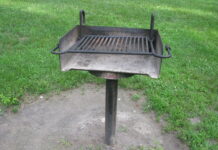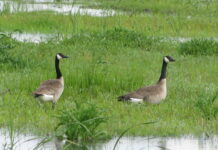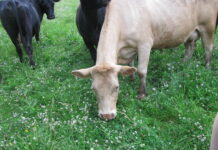Photo credit: DiasporaEngager (www.DiasporaEngager.com).
My life and career would be a lot easier if I just announced that #AsAJew, I denounce Zionism, and that I have a manuscript telling the story of how I cannot support the apartheid, settler-colonial, white European project in “Palestine.” Phone calls would be returned, emails would be read, and literary agents would compete in bidding wars to see who could give me the biggest advance.
Unfortunately, for my writing career and reputation, I don’t believe any of these things. And, frankly, I’d have to be a major Jewish household name like Naomi Klein for that fantasy to come true. Speaking of Naomi Klein, I recently read her book Doppelganger, in which she complains about being constantly confused with conspiracy theorist Naomi Wolf. Great book, until I reached the end, which was unreadable because of her belief that Israel mirrors European “settler colonialism.” Recently, Naomi Klein was prominently featured in a letter where renowned authors declared their withdrawal from the PEN World Voices Festival, citing the organization’s failure to adequately address what they termed as the ongoing “genocide” in Gaza.
That word. Genocide. It’s a word that is carefully chosen to troll Jews. Its purpose is to rob us of our claim to a specific kind of grief and to say, “See? You Jews are no better.” It is how the world absolves itself of guilt and complicity. It’s called Holocaust inversion, and is a form of antisemitism.
Writers, of all people, should know that words have meanings, but when it comes to Israel, they usually turn off their brains and begin sloganeering. The harder thing for them to do would be to look at the real history of the Israel-Palestinian conflict. Writers have a critical role to play in public discourse, but when they refuse to look at all claims with a critical eye, they’ve abdicated their responsibilities.
All this would be a somewhat dull academic game over definitions if it weren’t for the fact that anti-Zionist Jewish authors are the only ones being platformed by the general media. Not only that, but Zionist Jews are being de-platformed in literary spaces.
I’m currently working on a book called From Outrage to Action: A Practical Guide to Fighting Antisemitism. What began as a small section of my book is turning into a lengthy chapter. In fact, I could probably write an entire book about this subject alone. Many of the authors I interviewed for my book spoke to me on the condition of anonymity because they’re worried about their careers. It’s too late for me. Just Google me, and you can tell just how Zionist I am.
Even Jews who are not Israeli and don’t write about the Middle East are having doors slammed in their faces. Word in the industry is that editors, agents, and publishers just don’t want to hear from Jews now. There’s a great deal of fear among Jewish authors. They are losing contracts, calls are not being returned, and books are canceled because of a perception in the industry that there’s not really a market for Jewish voices, except those of the #AsAJew anti-Zionist variety. In addition, they are being harassed and bullied at literary events.
Stranger Things star Brett Gelman had numerous book signings cancelled because of his “Jewish identity,” and his support for Israel. Meanwhile, pro-Palestinian authors are frequently platformed, and championed as “diverse” voices.
One author told me how her agent expressed hesitation about one of her book ideas, which focused on a Jewish woman. Several publishers rejected or delayed considering her work after she submitted proposals, with some editors citing issues like “too much anti-Zionism” or a “saturated market” for books about certain Jewish topics.
Another author told of a friend who enthusiastically recommended her Jewish-themed book to an acquaintance working at a major Canadian cultural institution. The suggestion was to feature her book prominently within their programming. However, the response was shockingly dismissive: “We don’t want any Jews right now,” not referring to Israelis, but Jews in general.
Despite these challenges, Jewish authors are finding ways to respond. Many are more determined to write about Jewish issues, and efforts are underway to counter the anti-Zionist narrative through online petitions and public letters. An Open Letter on Antisemitism in the Literary Community is still open for signatures and seeks to address these issues head-on. I signed it proudly. Again, likely to the detriment of my career.
The Jewish Book Council (JBC) has been trying to get a handle on the extent of the problem. They’ve set up a hotline to understand the scope of issues that Jewish authors face, and are actively working to create practical resources. Naomi Firestone-Teeter, CEO of the JBC, stated, “We want to know, is it happening on a larger scale? Are these isolated incidents or a wider problem?” She is not sure what will be done with the data and stories being collected, though. My sense is that Jewish authors have been caught off-guard.
None of this is to say that Jewish authors, stories, and voices should receive preferential treatment in the marketplace of ideas. Publishing is a tough business, regardless of current events. The issue, however, is the hostility toward Zionist perspectives and general Jewish narratives. If you don’t endorse the narrative of “genocide,” you are quickly labeled a racist oppressor.
Most of the Jews I’ve interviewed, like myself, are left-wing but feel betrayed by the left for supporting what they see as murderers and fascists. They are frustrated not only because this view is wrong, but because it silences those whose lived experiences lead them to different conclusions. Antisemitism is so entrenched in the culture now that there is a tendency to lecture us about what antisemitism is — and isn’t. They assert repeatedly that anti-Zionism is not antisemitism, shouting over our lived experiences that suggest otherwise. And at the forefront of these “lectures” is the literary community, which is failing horribly to meet this moment in history and write about it with a critical eye. In fact, they are the bullies leading the charge.
What is the answer? Well, all I know how to do is write. I have a novel coming out next year called Found and Lost: The Jake and Cait Story. It’s about music, fame, aging, and second chances. Although one of the protagonists is Jewish, it’s not really about Judaism. This character is, to steal from Naomi Klein, sort of my doppelganger. He experiences his music as filtered through his perspective #AsAJew. I was fortunate to have found a publisher, Vine Leaves Press, that amplifies the voices of marginalized communities and counts Jews among them. See, publishers and agents? It isn’t hard to do. We all deserve to have our voices heard.
Howard Lovy is an author and editor based in Michigan, who is currently working on a book, From Outrage to Action: A Practical Guide to Fighting Antisemitism. His novel, Found and Lost: The Jake and Cait Story, will be released in 2025.
Source of original article: Howard Lovy / Opinion – Algemeiner.com (www.algemeiner.com).
The content of this article does not necessarily reflect the views or opinion of Global Diaspora News (www.GlobalDiasporaNews.com).
To submit your press release: (https://www.GlobalDiasporaNews.com/pr).
To advertise on Global Diaspora News: (www.GlobalDiasporaNews.com/ads).
Sign up to Global Diaspora News newsletter (https://www.GlobalDiasporaNews.com/newsletter/) to start receiving updates and opportunities directly in your email inbox for free.

































